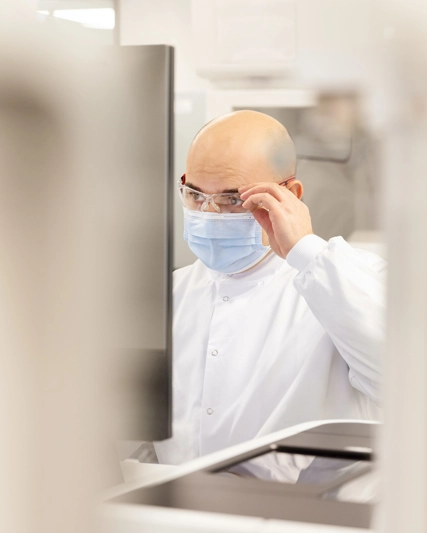Dr Rappuoli is excited at the prospect of using vaccines to eliminate some of the world’s worst diseases – vaccines are a powerful tool to help improve health outcomes in developing countries.
Today, life expectancy is 30 to 40 years longer than it was 100 years ago, and when we examine the reasons why, we see it’s mostly the result of our ability to conquer infectious diseases,” he said. “I think we need to remember the value of vaccines and how transformative they have been in keeping us healthy.
For these reasons and more, Dr Rappuoli says he eagerly awaits the future:
Today we are able to do things that we couldn’t even do five years ago. In another five years, I believe this progress will continue, and in 15 to 20 years, we’ll be doing things we could never dream of today.
Q: On the personal front, what inspired you to become a scientist?
There were many things, but there is one story which stands out. I was a biology student at the University of Siena and was fortunate enough to listen to a scientific talk given by the professor Albert Sabin, inventor of the oral polio vaccine.
When I saw him a few years later in the mid-70s, he gave a very passionate lecture about his work and how far science had progressed in a relatively short amount of time. By then, I had seen people my age with polio and knew what a terrible disease it was.
Hearing about Sabin’s work and what he achieved really inspired me. To this day that feeling has never left me.
Q: Why is it so important that GSK is a science-led organisation?
Everything we do here at GSK is based on science. Each scientific breakthrough over the years has paved the way for the creation of future vaccines for diseases currently beyond our reach.
If we go back in time, following the discovery that infectious agents were causing diseases, the first scientist who imagined the possibility of vaccination was Louis Pasteur.
Fast forward to the 1940s and it became possible to grow cells outside of their natural environment. Scientists could now grow viruses in the lab. This resulted in the development of vaccines against measles, mumps, rubella and polio.
The hard work of scientists didn’t end there. At the end of the 1970s, the next big discovery was conjugate vaccines; bringing antigens and carrier proteins together to help ensure adequate vaccine protection. This made vaccines against some of the commonest causes of pneumonia and meningitis possible.
Just a decade later and the discovery of recombinant DNA coupled with progress in genomics paved the way for the development of the first-ever Hepatitis B, Human Papillomavirus (HPV) and Meningitis B vaccines.
Today we’re working on innovation in areas such as adjuvant technologies which help improve the body’s immune response to certain vaccines. These advances have made our malaria and shingles vaccines possible.

Rino Rappuoli has won a lifetime achivement award
In June 2017, Rino was awarded a Lifetime Achievement Award by the European Patent Office at the European Inventor Awards.
Q: How can GSK stay at the leading edge of vaccines science?
We’re always trying to anticipate what could happen in the next 10-15 years and where the big advances in the vaccines world will come from. This means staying ahead of the curve particularly when it comes to technology.
Adjuvant technology is one example of being on the leading edge but our most futuristic approach involves synthetic vaccine technology called Self-Amplifying RNA or “SAM”- in short, delivering carefully chosen gene sequences into patient cells so that their body can produce the vaccine itself.
Q: Can GSK conduct leading science like this by itself?
The leading technologies I’ve already mentioned are a result of internal scientific work and external partnerships.
What’s critical for us is to be able to both discover new technologies and transform them into vaccines. Our unique value as a company lies in this ability to bridge the gap between scientific breakthroughs and real products making a difference to people’s lives.
To make this difference, we cannot stand still and wait for others to make the discoveries. We need to be working at the leading edge: conducting breakthrough science and developing an understanding of how best to collaborate.
In doing so, you become part of the scientific community, respected by your peers. We want to be the partner of choice for the best scientists and biotechs in the world, so that when someone has a new discovery making a potential new vaccine a possibility, they come to us because they know that with us they have the best chance to succeed. We need to remember that many of our best success stories, such as the meningitis vaccine programme come from collaboration with great external scientists.
Q: How do you ensure the spirit and practice of innovation permeate throughout such a large organisation?
What’s most important is the culture we have at GSK and the way we make decisions. Science lies at the heart of both.
Our work is not just about having great ideas; it’s also about supporting them scientifically. We ensure the entire organisation is aware of this and it helps infuse innovation into everything we do.
Q: Science can be hard work- how do you keep employees inspired?
We’re lucky because working in science is exciting in itself. I believe each person has a passion for innovating and finding something new; it’s basic human curiosity.
But as fascinating as science is, it’s also tough. The reality is that the majority of experiments fail so you need to manage your ability to be resilient and bounce back.
Knowing the ultimate outcome of our work helps. Our jobs are the best of the best because the passion for new scientific discovery is combined with an awareness that what we do improves the lives of millions of people.



